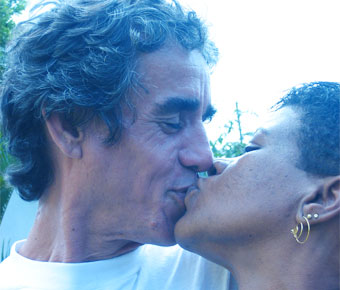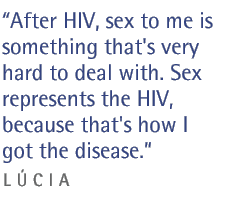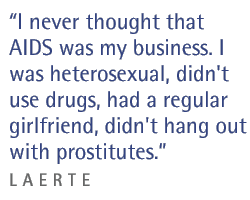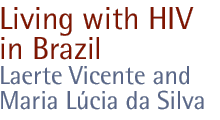
Laerte Vicente and Maria Lúcia da Silva ("Lúcia")
Although they now share their lives, Laerte Vicente and Maria Lúcia da Silva ("Lúcia") learned independently that they were HIV positive. They both experienced the withdrawal of family, friends and lovers, and struggled with the thought that their lives were over. Eventually they each found a community of other HIV-positive individuals -- and each other. They met at an event for an HIV/AIDS non-governmental organization (NGO). "Lúcia showed me I was alive," Laerte says. Lúcia agrees: "Laerte brought me happiness again." These are edited versions of interviews conducted for FRONTLINE by Marina Pecoraro, a Brazilian journalist, in April 2006.
Does your family know you're HIV positive?
Lúcia: When they discovered my HIV, I didn't tell my family. I got very depressed; I never thought that this disease could happen to me. I lost two gay friends and a girlfriend who was an alcoholic because of HIV. I believed AIDS was something that happens just with homosexuals or drug users.

The first person I told was my best friend, and she accepts and helps me a lot. Six months later I told my son, and he got very sad and worried. He was afraid of losing me. But he accepts and helps me a lot. As for my family, I told them last September. They didn't run away from me. We are still very close, and our relationship has not changed.
Laerte: I have 12 siblings. I never had a good relationship with my family. After I was diagnosed with HIV, the hospital tried to put me in touch with them, but it didn't work. They are very mean. They went to the hospital when I got sick in 2000, but after a while, I found out that they were trying to discover how much money and property I had.
How did you discover you were HIV positive?
Lúcia: I discovered my HIV because of herpes I had that didn't cure. I went to a dermatologist, and she asked me to take the HIV test. I took the exam with no fear. ... I never thought that the result could be positive. But when the laboratory called me to take the exam again, I started to worry.
When I got the test I opened it in the middle of the street, and suddenly I had the feeling that a huge hole appeared in the ground. At that time I was working in a bank, and I went back to work. I was looking at the test all the time, and that day I left early. I said that I had to visit a client. Two days later I went to see my dermatologist, and she sent me to a [virologist] who explained that I could live 15, 20 more years with HIV, but I didn't believe it. I thought that I would die in one week. I was very ashamed. I didn't talk to anyone. I decided to quit my job. ...
Are you afraid to tell people you're HIV positive? How did people react?
Lúcia: I was very afraid to tell people that I have HIV. In fact, it was hard for me to accept it, so telling others was very tough. I told my boyfriend of 10 years, and he wasn't shocked by the news. Now I think he knew he was HIV positive. After I told him, he never called me. I have no idea how he is right now. Other friends that I told ran away. When I told them, they seemed very understanding, but after a while they disappeared.
Laerte: Right now I'm not afraid to talk about my HIV, but because of the virus, my life has changed completely. I lost my girlfriend, who ran away when she found out. I lost my job, a lot of friends, my house. I almost went to live in a hostel. ... I got really depressed.
Besides all of this, when people found out about it, they thought I was gay or a drug user, because the stigma for AIDS among these groups was very high until now.
Since I started to frequent some HIV NGOs around 2002 and 2003, I changed the way I see HIV, and I'm not ashamed anymore.
What was your life like before you found out you were HIV positive?
Laerte: My life was very busy. I had a lot of work to do. ... I was heterosexual, didn't use drugs, had a regular girlfriend, didn't hang out with prostitutes. ...
How many pills do you take, and when?
Laerte: In the beginning I had to take around 35 pills -- a lot for the TB, others for the HIV, and others to fight the side effects of those drugs. Right now I take just three pills for the ARVs [antiretrovirals]: one in the morning, Biovir, and two in the evening, Biovir plus Efavirenz, a very simple scheme.

Do you talk to other HIV-positive people?
Lúcia: After I started to [attend] groups of people living with HIV organized by DIET, an AIDS NGO in Guarulhos, I started to deal differently with the virus, but it is still not something I like to tell everybody. I met Laerte, my new boyfriend, at this NGO. Now I sing in a choir at Centro de Referência e Treinamento DST/AIDS, a hospital where they treat AIDS. Laerte brought me happiness again.
Laerte: I remembered that I was afraid to become a part of the Grupo de Incentivo à Vida, GIV, a very old AIDS NGO here [which was formed by people living with HIV]. Rose, the nurse at the hospital I go to, suggested the group to me. I went three times before I had the courage to go in. My first day there was a party, and I saw everybody dancing, jumping, laughing and not dying. ... I could see I wasn't alone in this journey. ... I met Hugo, a guy that was living with HIV for 20 years! So I realized that I could be happy, too. After that I got money from a union to print a book with my poems, ... and my journey as an AIDS activist began.
What is access to doctors and treatment like?
Lúcia: I have private health insurance, so I can choose my doctors, and I have no complaints. My ARVs I get from the government, and I never have problems with it. I take three pills per day, and it is just fine.
Laerte: My treatment is at the Federal University Hospital of Sao Paulo. I have good doctors, my ARVs are always available, and the quality of the service is OK. But when you ... have to go to the emergency room, you have to wait forever. Last month I had terrible diarrhea and had to go twice to the hospital to be seen. The first day I had to wait four hours without being attended to. The next day I waited for a couple of hours.
Have people's attitudes about HIV changed?
Lúcia: I don't see any difference in people's reaction when I say I'm HIV positive compared to when I found out. The stigma and the prejudice against AIDS are very high here in Brazil.
Laerte: The reactions of the people today, in comparison to 2000, I think is the same. The difference is now I'm not ashamed anymore, and I accept my HIV. When a person stops talking to me after finding out about the virus, I don't care. I know that they're not my friend.
Do you have a job? What do you do?
Laerte: Before the HIV, I used to work as a cultural promoter and producer with community radio. I lost my job after the HIV. I almost died because of tuberculosis. I lost 25 kilograms [about 50 pounds], and my weight was 47 kilograms [about 100 pounds]. The doctors didn't know if I would survive.
When I got out of the hospital, I found out that all my colleagues knew about my HIV. My former girlfriend told everybody. After three years of some freelance work, I got a job as an office boy at the AIDS News Agency, a Web site that talks about HIV. I work there now and still do some cultural promotion, making around 450 reais [about $200] a month.
Did your attitude about sex change after HIV?
Lúcia: After HIV, sex to me is something that's very hard to deal with. Sex represents the HIV, because that's how I got the disease, so I link this with the virus. My relationship with Laerte is more friendship than sex. Of course we have it, but it is a taboo for me. I'm happy that he can understand this, and we talk a lot about it, and he helps me with it.
Laerte: I started to date Lúcia nine months after we met at an event at an AIDS NGO. I liked her the first time I saw her. I gave her a pamphlet, and we started to talk. At lunchtime we went out to find an ice cream store, and after that we started to talk frequently. The first kiss was in a park. Lúcia showed me that I was alive, that I could find a lover, and that I could have sex again. I was very afraid of being impotent. Now I'm very, very happy with Lúcia.
What is your biggest fear? What is your biggest dream?
Lúcia: My biggest dream is to live in peace, enjoy every single day, every sunny day, and enjoy all the little gifts that life gives to you. My beliefs have changed after HIV; I don't care anymore about money and other material things.
My biggest fear is to get sick in a bed, needing the help of others. I pray to God every day that this does not happen to me. When my time arrives, I want to die with no pain and suffering.
Laerte: My biggest dream is to publish a new book with my poems. I still work as a cultural promoter, and I learned more about HIV/AIDS to improve my role as an activist. I can say that in spite of the sad things brought on by HIV, it taught me compassion for others. I am now concerned for the others. I have plans to create a group for couples living with HIV, to discuss the problems we have.
I'm very afraid to be sick again like when I had TB and had to stay in bed, needing other people to take care of me. I want to die without suffering.
